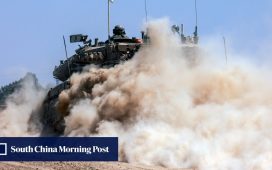A limited amnesty is to be offered to many of those detained in the recent Iranian protests, the country’s supreme leader Ayatollah Ali Khamenei has agreed.
But the amnesty does not apply to dual nationals, those convicted of offences carrying the death penalty or those who refuse to admit and regret their crimes, Iranian officials said.
The amnesty will not apply to those deemed to have cooperated with foreign agents, or those charged with committing acts of arson against government buildings. Those “affiliated with groups hostile to the Islamic Republic” will also be excluded, a catch-all that suggests the authorities may only be interested in releasing youngsters with minimal political motives, who can be portrayed as being swayed by emotion or foreign propaganda online.
The conditional amnesty was proposed to the leader of the Islamic Republic by Gholamhossein Mohseni Ejei, the head of the judiciary, and was presented as an act of reconciliation now that the street protests have been quashed. Requesting the pardon he said: “During recent events, a number of people, especially young people, committed wrong actions and crimes as a result of the indoctrination and propaganda of the enemy. Since the foreign enemies and anti-revolutionary currents’ plans have been foiled, many of these youth now regret their actions,” Ejei wrote.
He added: “These young people are not in any way against the Islamic Republic system, so we also offered them this opportunity by offering amnesty and closing their case at every stage so that their future will not be affected by criminal records. Obviously, if these pardoned people commit crimes again, they will be dealt with more severely according to the law.”
The government has yet to give a definitive figure of the number of those arrested who are still detained or likely to be eligible for the amnesty. Some reports said tens of thousands would be subject to the amnesty, and official news sites portrayed the amnesty as an important act of reconciliation, showing footage of prisoners apparently jubilant at the news. Human rights agencies have claimed that so far as many as 20,000 people have been arrested, and four people have been executed with a further 100 still at risk of execution based on the charges laid against them. The NGO Iran Human Rights dismissed the announcement as propaganda, adding no one should be charged for exercising the legitimate right to protest.
The amnesty came as two senior reformist politicians warned the government was facing a political dead end.
after newsletter promotion
Mohammad Khatami, the former president of Iran, said in a message that reforms in the country’s political structure have hit a “dead end”.
In a message coinciding with the 44th anniversary of the revolution, Khatami said his reforms did not require changing and amending the constitution but “returning to the spirit and even the text”. Khatami called for the freeing of political prisoners, freedom of the press, detaching the military from politics and improving the country’s judicial process and procedure. The government showed no signs of being willing to correct the mistakes of the past, he said.
A more radical reform message had been issued on Saturday by Mir Hossein Mousavi, one of the leaders of the 2009 Green Movement, in which he called for a nationwide referendum and the changing of the constitution. Mousavi’s words implied he had changed his view on whether the current constitution could be reformed.
In a message backed in a collective statement by seven leading political prisoners he called for the formation of a constituent assembly to draft a new constitution. Mousavi, who has been under house arrest since 2011, said: “Iran and the Iranians need a fundamental change, that takes its main features from the pure movement of ‘Woman, Life, Freedom’.” Those three words were “the seeds of a bright future, free of oppression, poverty, humiliation and discrimination,” he said.
He also urged the armed forces to stand on the side of freedom, urging the them not to forget “their covenant in protecting our land, Iran, and the lives, property, and rights of the people”.
Opposition leaders remain convinced that sections of the security forces are acutely aware that the regime is being held together primarily by endless domestic repression as opposed to popular support and are starting to fear the personal consequences if an uprising takes place.













